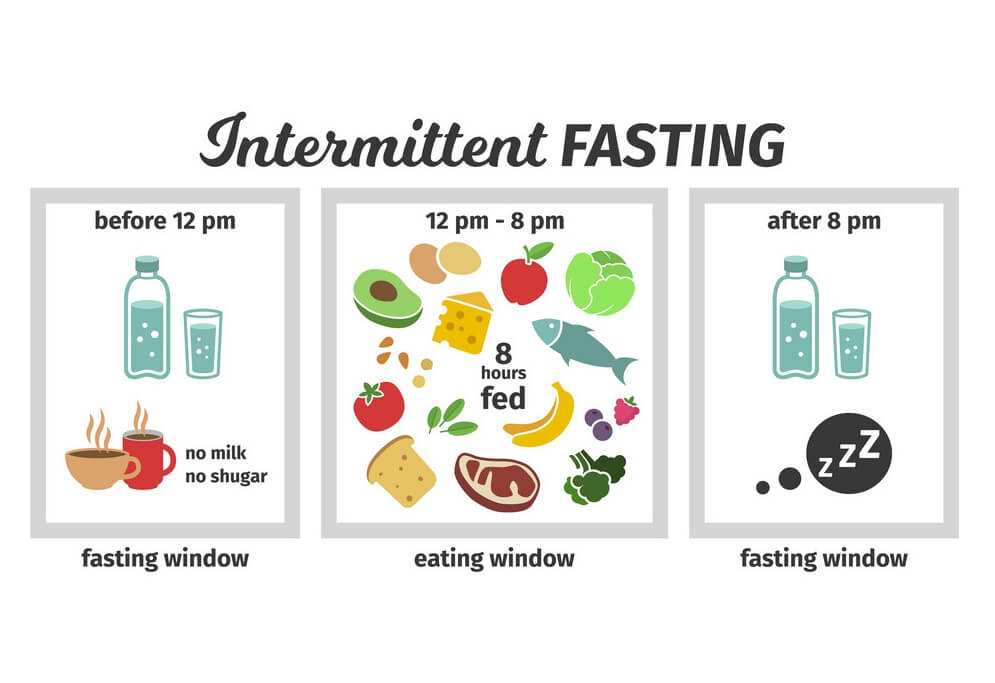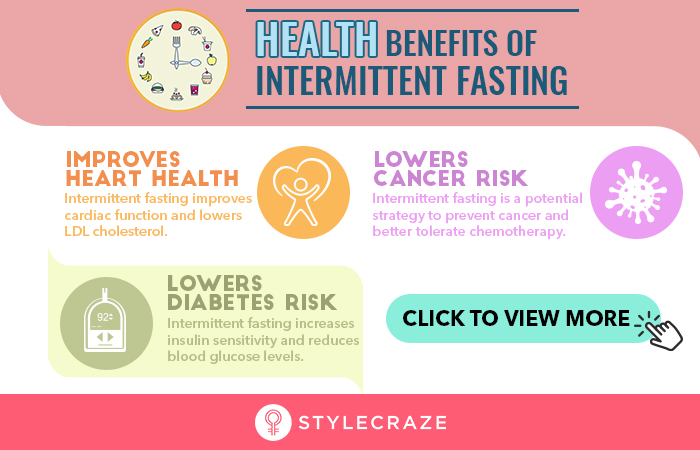
Surprising Benefits of Intermittent Fasting
Written: Editor | April 25, 2023

Health Benefits of Intermittent Fasting
Intermittent fasting has gained popularity as a promising approach to achieving better health. By incorporating regular periods of fasting into your eating schedule, intermittent fasting can offer several benefits beyond just weight loss.
Weight Loss and Improved Body Composition
Intermittent fasting can be an effective tool for weight loss and improving body composition. When you fast, your body switches from using glucose as fuel to using stored fat. This can lead to a decrease in body fat and a reduction in belly fat, which is associated with an increased risk of chronic diseases.
Enhanced Insulin Sensitivity and Blood Sugar Control
Another advantage of intermittent fasting is improved insulin sensitivity. This means that your cells become more responsive to insulin, allowing for better control of blood sugar levels. This can be especially beneficial for individuals with prediabetes or type 2 diabetes.
Boosted Brain Function and Mental Clarity
Intermittent fasting has been shown to enhance brain function and promote mental clarity. It increases the production of a protein called brain-derived neurotrophic factor (BDNF), which supports the growth of new neurons and improves cognitive function. Intermittent fasting may also reduce inflammation in the brain, which is associated with neurodegenerative diseases like Alzheimer's.
By adopting intermittent fasting, you can enjoy these health benefits while still enjoying the foods you love. However, it's important to consult with a healthcare professional before starting any new diet or fasting regimen, especially if you have preexisting medical conditions or are taking medication.
Whether your goal is weight loss, improved blood sugar control, or enhanced brain function, intermittent fasting offers a flexible and effective approach to better health. Give it a try and discover the benefits for yourself.

Physical and Metabolic Benefits of Intermittent Fasting
Intermittent fasting has gained popularity as a dietary approach that not only aids in weight management but also offers various health benefits. This eating pattern involves alternating periods of fasting and eating, which can range from 14 to 36 hours. Here are some of the key benefits of intermittent fasting:
Increased Energy Levels and Improved Physical Performance
One of the significant benefits of intermittent fasting is an increase in energy levels. By giving your body a break from eating for extended periods, your metabolism becomes more efficient in converting stored fat into energy. This can lead to improved physical performance during workouts and daily activities.
Reduction in Inflammation and Oxidative Stress
Intermittent fasting has been shown to reduce inflammation and oxidative stress in the body. These two factors are linked to the development of various chronic diseases, such as heart disease, diabetes, and cancer. By regularly fasting, you can potentially lower inflammation markers and protect against the harmful effects of oxidative stress.
Protection Against Chronic Diseases
Numerous research studies suggest that intermittent fasting may help protect against chronic diseases. It has been associated with improved insulin sensitivity, which is beneficial for preventing and managing type 2 diabetes. Additionally, intermittent fasting has shown promise in reducing the risk of heart disease and certain types of cancer.
In summary, intermittent fasting offers both physical and metabolic benefits. It can increase energy levels, improve physical performance, reduce inflammation and oxidative stress, and potentially protect against chronic diseases. However, it's important to consult with a healthcare professional before embarking on any fasting regimen, especially if you have any preexisting health conditions.

Psychological and Emotional Benefits of Intermittent Fasting
Intermittent fasting, the practice of cycling between eating and fasting periods, has gained popularity for its numerous health benefits. However, it's not just physical health that benefits from this eating pattern. Intermittent fasting also has positive psychological and emotional effects.
Improved Mood and Cognitive Function
When you fast, your body goes through metabolic changes that can enhance your mood and cognitive function. Research suggests that fasting stimulates the production of brain-derived neurotrophic factor (BDNF), a protein that promotes the growth of new neurons and protects existing ones. This increase in BDNF levels has been linked to improved mood, memory, and overall brain function.
Enhanced Focus and Productivity
Intermittent fasting has also been found to improve focus and productivity. When your body is in a fasted state, it increases the production of ketones, which are an alternative source of energy for the brain. Ketones are known to provide a more stable and consistent fuel source, leading to enhanced mental clarity and focus.
Positive Effects on Emotional Well-being and Stress Management
Intermittent fasting can have a positive impact on emotional well-being by reducing stress levels. When you fast, your body experiences a mild form of stress, which in turn helps it become more resilient to other stressors. Additionally, fasting has been found to decrease the production of the stress hormone cortisol, resulting in a calmer and more balanced emotional state.
In conclusion, intermittent fasting offers not only physical health benefits but also psychological and emotional advantages. Improved mood, cognitive function, focus, productivity, and stress management are just a few of the positive effects that can be experienced through this eating pattern. Consider incorporating intermittent fasting into your lifestyle for an overall boost in well-being

Intermittent Fasting Tips and Strategies
Intermittent fasting has gained popularity as a way to improve health, support weight loss, and boost overall well-being. However, starting this new eating pattern can feel overwhelming. Here are some tips and strategies to help you get started and make the most of your intermittent fasting journey.
How to Start Intermittent Fasting Safely
-
Consult a healthcare professional: Before starting any new eating plan, it's important to consult with a healthcare professional, especially if you have any underlying medical conditions or take medication.
-
Choose the right method: There are several different methods of intermittent fasting, such as the 16/8 method or the 5:2 method. Find the approach that best suits your lifestyle and goals.
Best Practices for Successful Intermittent Fasting
-
Stay hydrated: Drink plenty of water during fasting periods to stay hydrated and curb hunger cravings.
-
Eat balanced meals: When you break your fast, focus on consuming nutrient-dense, balanced meals that include protein, healthy fats, and carbohydrates from whole foods.
-
Listen to your body: Pay attention to your body's hunger and fullness cues. Don't force yourself to eat if you're not hungry and don't overeat during your eating periods.
Managing Hunger and Food Cravings during Fasting Periods
-
Keep busy: Engage in activities that keep your mind and body occupied during fasting periods to distract yourself from hunger or food cravings.
-
Drink herbal tea or coffee: Sipping on herbal tea or black coffee can help suppress appetite and provide a sense of satiety.
-
Include fiber-rich foods: Incorporate high-fiber foods, such as fruits, vegetables, and whole grains, in your meals to promote feelings of fullness.
Remember that intermittent fasting may not be suitable for everyone, and it's essential to listen to your body and make adjustments as needed. By following these tips and strategies, you can safely and effectively incorporate intermittent fasting into your lifestyle.

Common Myths and Misconceptions about Intermittent Fasting
Intermittent fasting has gained popularity in recent years as a method for weight loss and improving overall health. However, there are several misconceptions surrounding this eating pattern that often cause confusion. Let's debunk some of the most common myths about intermittent fasting.
Debunking the Starvation Mode Myth
One of the main concerns people have about intermittent fasting is that it could put the body into a “starvation mode,” causing it to slow down metabolism and hold onto fat. However, this is simply not true. Research has shown that short-term fasting does not lead to a decrease in metabolic rate. In fact, intermittent fasting can actually improve metabolic function by promoting fat burning and increasing insulin sensitivity.
Clarifying the Relationship between Intermittent Fasting and Metabolism
Contrary to what some may believe, intermittent fasting does not slow down the metabolism. In fact, it can have the opposite effect. When you fast, your body starts tapping into its fat stores for energy, which can lead to weight loss. Additionally, intermittent fasting has been shown to increase levels of human growth hormone (HGH), which can help preserve muscle mass and boost metabolism.
Addressing Concerns about Muscle Loss during Fasting
Many people worry that fasting will cause muscle loss. However, research has shown that intermittent fasting does not lead to significant muscle loss, especially when combined with regular exercise and adequate protein intake. In fact, it can even preserve muscle mass by stimulating the production of growth hormone.
In conclusion, intermittent fasting is a safe and effective eating pattern for weight loss and overall well-being. It does not slow down metabolism, cause starvation mode, or result in significant muscle loss. Understanding the facts and dispelling these common myths can help individuals make informed decisions about incorporating intermittent fasting into their lifestyle.

Conclusion
Intermittent fasting can offer numerous benefits for individuals who want to improve their overall health and well-being. By following an intermittent fasting protocol, people can experience weight loss, improved insulin sensitivity, increased energy levels, and reduced inflammation. It can also support brain health, boost metabolism, and promote longevity.
Recap of the Key Benefits of Intermittent Fasting
- Weight Loss: Intermittent fasting can help individuals shed excess weight and reduce body fat.
- Improved Insulin Sensitivity: By regulating blood sugar levels, intermittent fasting can enhance insulin sensitivity, reducing the risk of diabetes.
- Increased Energy Levels: Fasting can stimulate the release of human growth hormone (HGH), leading to increased energy and improved performance.
- Reduced Inflammation: Fasting has been found to reduce inflammation in the body, which may help prevent chronic diseases.
- Brain Health: Intermittent fasting has been linked to improved brain function and protection against age-related cognitive decline.
Considerations and Precautions for Starting Intermittent Fasting
Before starting an intermittent fasting regimen, individuals should consider their overall health and consult with a healthcare professional. It's important to start gradually and listen to your body's signals. Adequate hydration and proper nutrition during eating windows are also crucial. Intermittent fasting might not be suitable for everyone, especially those with certain medical conditions or who are pregnant or breastfeeding.
Embracing Intermittent Fasting as a Sustainable Lifestyle Choice
To successfully incorporate intermittent fasting into your lifestyle, consistency is key. It's essential to find a fasting schedule that works for you and fits into your daily routine. Building good habits and maintaining a balanced and nutritious diet during eating windows will help ensure long-term success. Remember, intermittent fasting is not a quick fix but a sustainable lifestyle choice that can bring about lasting health benefits.



